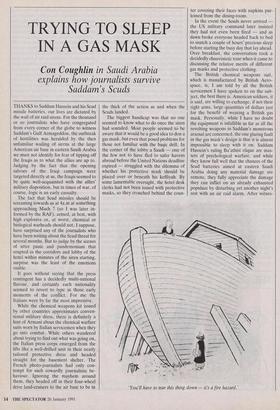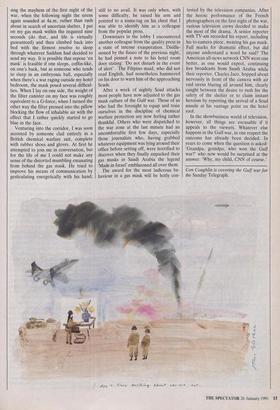TRYING TO SLEEP IN A GAS MASK
Con Coughlin in Saudi Arabia
explains how journalists survive Saddam's Scuds
THANKS to Saddam Hussein and his Scud missile batteries, our lives are dictated by the wail of air raid sirens. For the thousand or so journalists who have congregated from every corner of the globe to witness Saddam's Gulf Armageddon, the outbreak of hostilities was heralded by the then unfamiliar wailing of sirens at the large American air base in eastern Saudi Arabia we must not identify for fear of tipping off the Iraqis as to what the allies are up to. Judging by the fact that the opening salvoes of the Iraqi campaign were targeted directly at us, the Iraqis seemed to be quite well-acquainted with the allies' military disposition, but in times of war, of course, logic is an early casualty.
The fact that Scud missiles should be screaming towards us at 4a.m at something approaching Mach 7 (so I was later in- formed by the RAF), armed, at best, with high explosive or, at worst, chemical or biological warheads should not, I suppose, have surprised any of the journalists who have been writing about the Scud threat for several months. But to judge by the scenes of utter panic and pandemonium that erupted in the corridors and lobby of the hotel within minutes of the siren starting, surprise was the least of the emotions visible.
It goes without saying that the press contingent has a decidedly multi-national flavour, and certainly each nationality seemed to revert to type in those early moments of the conflict. For me the Italians were by far the most impressive. ' While the chemical weapons kit issued by other countries approximates conven- tional military dress, there is definitely a hint of Armani about the chemical warfare suits worn by Italian servicemen when they go into combat. While others wandered about trying to find out what was going on, the Italian press corps emerged from the lifts like a well-drilled unit in their neatly tailored protective dress and headed straight for the basement shelter. The French photo-journalists had only con- tempt for such cowardly journalistic be- haviour. Ignoring the mayhem around them, they headed off in their four-wheel drive land-cruisers to the air base to be in the thick of the action as and when the Scuds landed.
The biggest handicap was that no one seemed to know what to do once the siren had sounded. Most people seemed to be aware that it would be a good idea to don a gas mask, but even that posed problems for those not familiar with the basic drill. In the corner of the lobby a Saudi — one of the few not to have fled to safer havens abroad before the United Nations deadline expired — struggled with the dilemma of whether his protective mask should be placed over or beneath his keffiyah. By some lamentable oversight, the hotel desk clerks had not been issued with protective masks, so they crouched behind the coun- ter covering their faces with napkins pur- loined from the dining-room.
In the event the Scuds never arrived the US military command later insisted they had not even been fired — and as dawn broke everyone headed back to bed to snatch a couple of hours' precious sleep before starting the busy day that lay ahead. Over breakfast, the conversation took a decidedly chauvinistic tone when it came to discussing the relative merits of different gas masks and protective clothing.
The British chemical weapons suit, which is manufactured by British Aero- space, is, I am told by all the British servicemen I have spoken to on the sub- ject, the best there is. American soldiers, it is said, are willing to exchange, if not their right arms, large quantities of dollars just for the benefit of wearing a British gas mask. Personally, while I have no doubt the equipment is infallible as far as all the revolting weapons in Saddam's monstrous arsenal are concerned, the one glaring fault in the gas mask's design is that it is almost impossible to sleep with it on. Saddam Hussein's ruling Ba'athist clique are mas- ters of psychological warfare, and while they know full well that the chances of the Scud batteries aimed at eastern Saudi Arabia doing any material damage are remote, they fully appreciate the damage they can inflict on an already exhausted populace by disturbing yet another night's rest with an air raid alarm. After witnes- `You'll have to tear this thing down — it's a fire hazard.' sing the mayhem of the first night of the war, when the following night the sirens again sounded at 4a.m, rather than rush about in search of uncertain shelter, I put on my gas mask within the required nine seconds (do that, and life is virtually guaranteed) and then climbed back into bed with the firmest resolve to sleep through whatever Saddam had decided to send my way. It is possible that repose 'en mask' is feasible if one sleeps, coffin-like, on one's back, but as someone who tends to sleep in an embryonic ball, especially when there's a war raging outside my hotel bedroom, the mask posed several difficul- ties. When I lay on one side, the weight of the filter canister on my face was roughly equivalent to a G-force; when I turned the other way the filter pressed into the pillow blocking the flow of inhalable air with the effect that I rather quickly started to go blue in the face.
Venturing into the corridor, I was soon accosted by someone clad entirely in a British chemical warfare suit, complete with rubber shoes and gloves. At first he attempted to join me in conversation, but for the life of me I could not make any sense of the distorted mumbling emanating from behind the gas mask. He tried to improve his means of communication by gesticulating energetically with his hand; still to no avail. It was only when, with some difficulty, he raised his arm and pointed to a name-tag on his chest that I was able to identify him as a colleague from the popular press.
Downstairs in the lobby I encountered another colleague from the quality press in a state of intense exasperation. Disillu- sioned by the fiasco of the previous night, he had pinned a note to his hotel room door stating: 'Do not disturb in the event of alert' . The Filipino maid, who did not read English, had nonetheless hammered on his door to warn him of the approaching Scuds.
After a week of nightly Scud attacks most people have now adjusted to the gas mask culture of the Gulf war. Those of us who had the foresight to equip and train ourselves in the discipline of chemical warfare protection are now feeling rather thankful. Others who were dispatched to the war zone at the last minute had an uncomfortable first few days, especially those journalists who, having grabbed whatever equipment was lying around their office before setting off, were horrified to discover when they finally unpacked their gas masks in Saudi Arabia the legend `Made in Israel' emblazoned all over them.
The award for the most ludicrous be- haviour in a gas mask will be hotly con- tested by the television companies. After the heroic performance of the French photographers on the first night of the war, various television crews decided to make the most of the drama. A senior reporter with TV-am recorded his report, including his to-camera piece, wearing his gas mask. Full marks for dramatic effect, but did anyone understand a word he said? The American all-news network CNN went one better, as one would expect, continuing live broadcasts from Saudi Arabia while their reporter, Charles Jaco, hopped about nervously in front of the camera with air raid sirens blaring all around him, clearly caught between the desire to rush for the safety of the shelter or to claim instant heroism by.reporting the arrival of a Scud missile at his vantage point on the hotel roof.
In the showbusiness world of television, however, all things are excusable if it appeals to the viewers. Whatever else happens in the Gulf war, in one respect the outcome has already been decided. In years to come when the question is asked: `Grandpa, grandpa, who won the Gulf war?' who now would be surprised at the answer: 'Why, my child, CNN of course.'
Con Coughlin is covering the Gulf war for the Sunday Telegraph.



























































 Previous page
Previous page